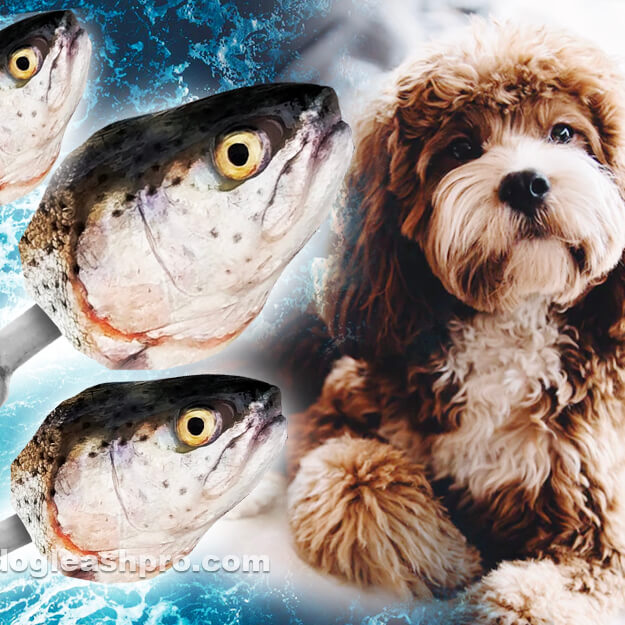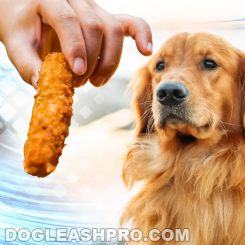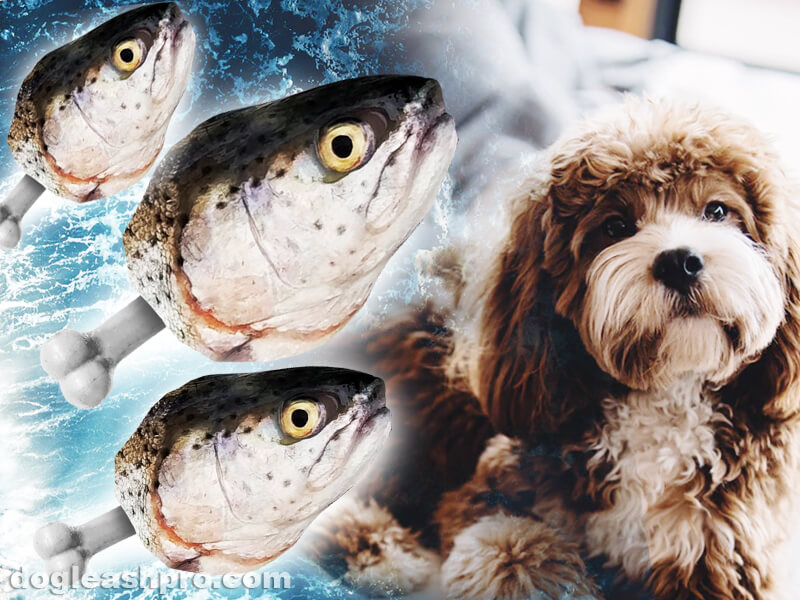
I visited my friend yesterday for lunch. She was making salmon head fish soup and added a few ingredients like Bay Leaves, fresh dill, and salt. When the soup was done, she threw away the Fish head. Her dog started to rummage through the trash bin to get to the Fish head. My friend ran over to cover the trash because she was worried. This left us both wondering if Fish heads are safe for dogs to eat and inspired me to write this article.
Can dogs eat Fish heads? Yes, dogs can eat Fish heads in moderation because they are packed full of nutrients, protein, and omega-3 fatty acids. However, there are a few things to keep in mind when feeding your canine friends this seafood, including picking fast-growing fish due to its softer bones and making sure the Fish heads have been frozen beforehand.
Table of Contents
Are Fish heads safe for dogs?
Whether Fish heads are safe for dogs to eat really boils down to these factors:
- Your canine family member’s size, age, and stomach.
- Type of fish and its Fish heads.
Here are several factors to help you determine the best type of fish that are safe for dogs to eat. These factors include:
- Fish with shorter lifespans and grow relatively fast such as Salmon, sardines, flounder, walleye, herring, and arctic char.
- Smaller species of fish with a lower likelihood of parasite infection and mercury levels.
- Fish bones are softer so they are easier to swallow and digest without being a choking hazard.
Health benefits of Fish heads for dogs
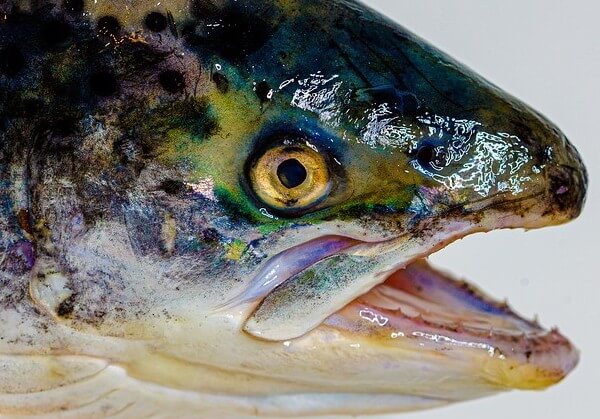
Our furry companions will receive numerous nutritional benefits from eating Fish heads. Most dogs are naturally drawn to the strong fishy smell of the Fish heads and many of them also love the taste of fish as well.
A lean source of protein for canines
Compared to other protein sources like chicken or beef, fish is a lean protein source that contains only a small amount of saturated fats. Protein helps our four-legged friends build strong muscles and improve their blood vessels and heart health.
If your pooch has a restricted diet and is allergic to certain types of meat or food, fish can be a great alternative for protein.
Fun Fact: If you’re looking for other ways to add protein to your dog’s diet, you can use amaranth. Amaranth is packed full of protein, minerals, and amino acids. Check out Can Dogs Eat Amaranth? to find out how this superfood can help improve your dog’s overall health.
Omega-3 fatty acids improve the dog’s skin, fur, cholesterol, and inflammation
Fish heads, especially salmon Fish heads, contain healthy omega-3 fatty acids, which help maintain heart health and lowers cholesterol in dogs. The omega-3 fatty acids also provide your furry friends with shiny, healthy, and smooth skin and coat.
If your four-legged friends have inflammation, it’s a good idea to eat food that contains fatty acids.
Fatty acids help with the following:
- Reduce arthritis or other joint problems.
- Lower the chances of inflammatory disease.
- Reduce inflammation throughout the body.
- Ensure your precious pups live a long healthy life.
- Live an active and happy life because they can run and walk easily.
Provides essential vitamins and minerals for dogs
In addition to omega-3 fatty acids, Fish heads are also packed with vitamins and minerals. In fact, there is a high level of zinc, iron, and vitamin A.
Vitamin A provides several health benefits for dogs
You may have heard that vitamin A is good for vision and eye health and that is very true. This vitamin in Fish heads also helps with brain health. The fat-soluble vitamin is an antioxidant that strengthens your pup’s immune system and helps with cell function, fetal development, and growth.
Iron is an essential mineral all dogs need
Fish heads contain iron, which is a mineral that all dogs need. This mineral helps your pup’s body perform the following essential functions:
- Metabolizes energy.
- Provides certain enzymes in your furry friend’s body to function properly.
- Proper functions of the circulatory system.
- Create hemoglobin and red blood cells.
- Carry oxygen in the hemoglobin.
Zinc is a great antioxidant for dogs
Zinc is also an antioxidant that all canines need. Our four-legged friends need zinc daily because this antioxidant helps with internal processes. Unfortunately, our pups are not able to store zinc in their bodies, which means they need it daily so their bodies can function properly.
When dogs receive zinc from their food, we don’t know how much of the zinc will actually get absorbed into their bodies. It really depends on the quality of the food.
Fortunately, your dogs’ bodies will have an easier time absorbing nutrients from Fish heads and fish than from other food sources like beef or even chicken.
Handy Hint: It’s important to add veggies to your pup’s diet. Brussel sprouts are packed with vitamins, minerals, and fiber – all of which are great for the dog’s overall health and wellbeing.
Collagen is great for senior dogs
If you have senior or older dogs, it’s fine to give them Fish heads to eat and chew on. Fish heads can help give your senior dogs a healthier coat and skin. In fact, the Fish heads can even help with your dog’s bone and joint health.
The collagen in the Fish heads can also aid in a dog’s digestion.
It is also much easier for the dog’s body to absorb collagen from the Fish heads and fish (of up to 1.5 times) than it is to absorb collagen from pork or beef.
Types of fish that are not recommended for dogs
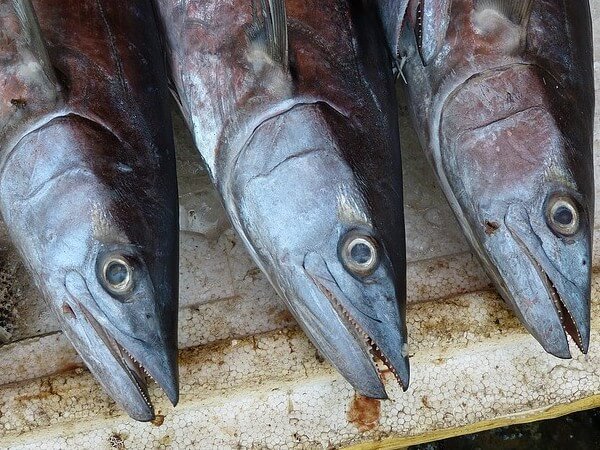
We highly advise that you completely avoid feeding your pooch these types of fish and the Fish heads:
- Swordfish.
- Tuna.
- King mackerel.
- Orange roughy.
- Shark.
- Farm-raised fish
These types of fish are not as healthy for your furry friends because they do grow slower and by the time they are harvested, they are much older, larger, and can contain high levels of mercury in their bodies.
If your canine companions eat any of the above types of fish and the Fish heads of these types of fish, they are at risk of absorbing the high mercury level and other toxic heavy metals from the fish.
Mercury accumulation in the fish’s system can create metal toxicity over time. The older these types of fish get, the greater the chance of having parasites in their internal organs, skin, and even muscle tissues.
The parasites may move around the fish’s system and move up to the Fish heads where it stays in the muscle tissues of Fish heads.
For these reasons, it’s best to avoid fish species that have longer lifespans. Keep in mind that the longer the fish lives, their bones get harder, larger, and stronger. Because of this, the bones from the Fish heads could be a potential choking hazard.
The sharp hard bones may even cause internal tears of the organ walls or internal blockage in your dog’s digestive system. If the internal blockage is left untreated, it can become fatal for dogs.
Your pup will need surgery to remove the bones from his or her body so an emergency trip to the veterinary hospital is necessary. That’s an unexpected expensive emergency bill you were not expecting.
If your pooch has never had Fish heads before, try giving them a small piece and see how they react. Some dogs may have a bad reaction to the Fish heads. In this case, it’s best to avoid giving him the Fish heads again.
Dogs that enjoy the Fish heads and do not have any negative reactions can continue to eat them.
If you are not sure of whether you can give Fish heads to your pups, we highly recommend that you speak with your dog’s veterinarian. You can also ask your vet to find out which type of fish is best for your puppy’s size, stomach, age, and eating habits.
Farm-raised fish is not safe for dogs
We recommend that pet owners avoid feeding their canine companions fish that are farm-raised because these farm-raised fish may contain toxins, dyes, and higher residual antibiotic levels which can be toxic to our canine friends.
How to properly prepare Fish heads for your dogs
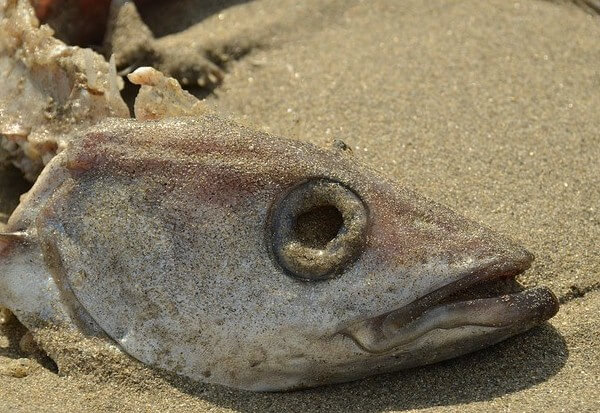
Proper preparation of Fish heads before allowing your dogs to eat them is important.
Cook in plain water without seasoning is best for dogs
If you cook the Fish heads for your pooch, make sure you’re only using water. Do not add in any oil, seasoning, or other flavors. Plain-cooked Fish heads are best for dogs.
Dogs that eat fried or oily Fish heads may start to get gastrointestinal issues. In severe cases, your pooch may get pancreatitis. So it’s best to avoid cured, smoked, or fried Fish heads as these are not safe for dogs to eat.
If you added garlic seasoning to the Fish heads, do not feed them to your pooch. Garlic is one of the ingredients that are toxic to dogs.
Handy Hint: The moment you add garlic to the food you’re making, that food is no longer safe for dogs to eat. To learn more about garlic poisoning, check out our Can Dogs Eat Lasagna article.
Avoid feeding dogs raw fresh Fish heads
Try not to give your pooch fresh Fish heads. Instead, it’s best to freeze the raw Fish heads for about 1 to 3 weeks first before feeding them to your furry friends.
If you’re feeding your pup salmon Fish heads, you should freeze the Fish heads first. Doing so will inactivate the organism that can cause salmon poisoning.
Salmon poisoning in dogs
Salmon poisoning in dogs is not fun. Many of the raw fish from the Pacific Northwest, including raw salmon, may carry an organism that can cause salmon poisoning in canines.
Salmon poisoning symptoms in dogs:
- Vomiting.
- Diarrhea.
- Loss of appetite.
- Weight loss.
- High fever.
- Die (in severe cases and if the salmon poisoning is left untreated).
Can dogs have allergies to Fish heads?
More and more dog owners are now introducing or adding fish to their furry friends’ diet as an alternative protein source. In the past, fish allergies in dogs were uncommon because most dogs were fed either chicken or beef to get their daily dose of protein.
However, as more dogs are fed fish and Fish heads, fish allergies have become more apparent.
Here are some signs and symptoms of fish allergies in dogs:
- Itchy skin.
- Ear infections.
- Wheezing.
If you notice these symptoms, it’s best to stop feeding Fish heads or fish to your canine friends. We recommend that you also speak with your vet to discuss your observation and confirm that your pups have fish allergies.
Can dogs eat raw Fish heads?
Dogs can eat raw Fish heads only if the Fish heads have been deep-freeze for about 1 to 3 weeks before eating. This will inactivate any bad organism inside the fish.
Avoid feeding your dog raw Fish heads that are fresh as they could contain parasites in the internal organs, skin, or muscle tissues of the fish. If you have female dogs that are pregnant or have puppies, avoid giving them raw Fish heads.
The parasites could harm your pregnant female dogs as well as your puppies. Your puppies’ body and immune system may not be strong enough to handle the parasites.
For these reasons, be sure to cook the Fish heads thoroughly before serving them to your dogs. You can cook the Fish heads by boiling, baking, or steaming them. Any one of these three methods will ensure that the Fish heads are cooked fully and that they are safe for dogs to eat.
Raw and rotten Fish heads can contain tons of dangerous bacterial organisms that could get transmitted to your pups if eaten.
These bacterial organisms include clostridium, salmonella, and listeria.
Handy Hint: Avoid feeding your canine friends rotten foods such as Spoiled Meat because they contain tons of toxins and deadly bacterias that will make your pups sick.
How many Fish heads can a dog eat?
Dogs should eat Fish heads in moderation. While Fish heads provide many health benefits for dogs, too much of any food can also cause health problems.
It’s best to serve fish as a treat. If you would like to feed your pup fish as a dietary supplement, it’s fine to do so 3 to 5 times a week depending on the size, age, and stomach of your dog.
We recommend that you consult with your vet to find out how many Fish heads you can feed your four-legged friends. Since no two dogs are the same, it’s best to seek the opinion of your dog’s vet for this answer.
Keep in mind that fish should make up only 10% of your pup’s daily nutritional diet. This means your canine friends can eat one small-sized Fish head every day.
If your pup is refusing to eat his chicken or beef, then you can use Fish heads or fish as an alternative protein substitute. Fish is a great protein source especially for dogs with inflammatory diseases, allergies, or arthritis.
So, can dogs eat Fish heads?
Dogs can definitely eat Fish heads, but in moderation. Fish heads are packed with protein, minerals, vitamins, and fatty acids that are great for dogs. These nutritional values can improve your pups’ physical and mental wellbeing as well as their overall health.
Be sure to give your pooch the right type of fish. The fish should be small, fast-growing, and have soft bones. These types of fish have lower levels of parasites and mercury.
Proper preparation of the Fish heads is important too. Before you feed them to your furry friends, cook them thoroughly. You can bake, steam, or boil the Fish heads. All in all, Fish heads make for a great treat or dietary supplement to your canine’s existing diet.
DISCLAIMER: THIS WEBSITE DOES NOT PROVIDE MEDICAL ADVICE
The information, including but not limited to, text, graphics, images and other material contained on this website are for informational purposes only. No material on this site is intended to be a substitute for professional veterinary advice, diagnosis, or treatment. Always seek the advice of your veterinarian or other qualified health care provider with any questions you may have regarding dietary needs.
Resources:
https://en.wikipedia.org/wiki/Fish_head
https://www.cdc.gov/salmonella/dog-food-05-12/pet-owners-info.html

With over five years of specialized experience as an animal writer, my expertise lies in dog nutrition, health, behavior, grooming, and training. I am dedicated to delivering helpful and informative content that caters to the well-being of our furry friends. My primary goal is to empower pet owners with knowledge and ensure our canine companions thrive in health and happiness. In my free time, I love volunteering at local dog rescue centers.
